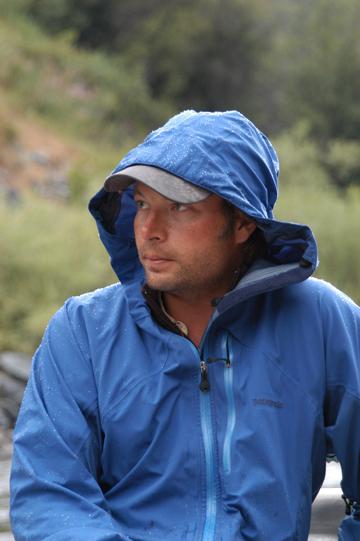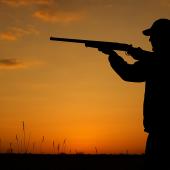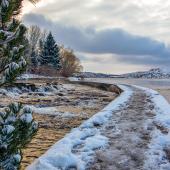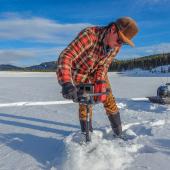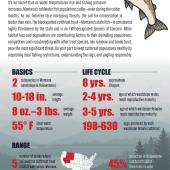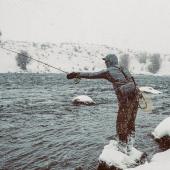Worship in the Parish of Rivers
You awake before the sun, eager and excited to float the crystalline waters of the Five Rivers region in Southwest Montana. You imagine the trout slipping, hiding, and spinning beneath the foam of the Big Hole, the Jefferson, the Beaverhead, the Wise, and the Ruby rivers. Your warm cup of Guatemalan steams in your hand, and as you take long, invigorating sips, the horizon livens with the deep oranges and blues that characterize Montana daybreak. Checking your fly box and vest one last time, you glance at your watch. Almost seven-thirty… where is he? Suddenly the tranquil hum of the awakening valley—the low pitch of blowing pine needles and sagebrush—is split by the clamoring of boots on the hardwood deck. “You ready?” an animated voice questions you from behind. “Sorry I’m a few minutes late… had to put the finishing touches on this woolly bugger.”
You smile, stand, and take in the appearance of your guide for the day: Teva sandals, mesh ball cap studded with homemade flies, flannel shirt, and quick-dry pants, his waders draped haphazardly over his shoulder, covering the ponderous beaded necklace from which hang his many gadgets and tools. “Morning,” you say, as you gather your equipment, “Gonna stick some fish today, are we?” You notice your guide is staring off into the nearby meadow where his German short hair has already pointed on a pheasant. Pause. “You betcha!” he belts out. “Gonna see some pretty country, too.” You laugh to yourself, and think, “Wow, I never met a guide with anything on his mind other than fish.” But you also know that there’s more to fishing than the fish. And that’s why you chose Holden Hughes as your guide in the first place. He’s considered one of the premier anglers in the region—not only for his ability to find the fish, but also for his youthful spirit, infinite knowledge of the local environment, and reverence for the divinity of nature, all of which embody the very essence of Montana… and of fishing itself.
It is a glorious, albeit chilly, Sunday afternoon in November when I join Hughes at the Mint Café in Belgrade, Montana. Just minutes outside of Bozeman, the main street of Belgrade, on which the café sits, is excitingly reminiscent of a scene from a John Ford movie. As I enter, Hughes is already working on his cheeseburger and fries, and I sit down to explain to him why I’m late. A lengthy church service in Bozeman had detained me, and I apologize profusely as a carefree smile crests Hughes’ face.
“I’ve already been to church today,” Hughes says with a mouthful of beef. I look at him suspiciously, knowing he’s not the church-going type. He grins, and gently nods his head toward the café’s open door, and to the many rivers and creeks beyond its threshold. I know what he’s trying to say.
Hughes’ church is different from mine. River rock comprises its walls. Its pews are the rower’s seats in driftboats, and its sacrament is the glistening waters into which he casts his flies. It is the river—wild nature and the blue sky above—which tender Hughes solitude and redemption. The river is his Providence.
“I lived lots of places before I finally made it here,” Hughes says, looking fondly out the tableside window at the mountain peaks on the horizon. “I was born in Bolivia—my dad was in the service—then moved around a bit until I ended up in Austin, Texas.” Regardless of where he lived, as a child Hughes always made time for fishing and the outdoors. After trying his hand at college, both at Texas Tech and Georgia’s Oglethorpe, it was the world outside the classroom that triumphed in Hughes’ soul.
“I originally caught the fly-fishing bug in the Smoky Mountains of North Carolina,” Hughes recalls, chuckling at the play on words, “and Montana began to call to me. I mean, growing up fishing, you hear river names like the Madison, the Missouri—most of the great rivers synonymous with fishing are in Montana.”
Hughes finally followed his soul to the Big Sky state in the summer of ‘95, where he began the first of a series of guiding jobs. He guided fishing trips, elk hunts, bear hunts, and worked for some of the most esteemed outfitters in the Rockies. Still, the rivers called to him, and eventually he had to acquiesce. In the spring of ’98, Hughes moved to Dillon, Montana and took work as a guide at the world-renowned Five Rivers Lodge where floating the famous rivers he’d heard about as a boy would be the bulk of his duties.
“I look at the country in this part of Montana—the valleys, the sky, the peaks—it’s a world of its own,” Hughes says. “You open your eyes in the morning, see the landscape, and you think, ‘Hey! I’m in Montana.’ It’s independent. It’s unique. I like that.”
This is not a surprising statement when one considers that Hughes is equally independent and unique. In a time when it’s popular for Montanans to support large-scale fishing regulations—Dillon has already instituted an ordinance that limits fishing by out-of-state visitors—Hughes takes a rebellious stand. “You look at the town of Dillon—most everyone is poor, many are hungry—and you wonder why in the world they want to limit their area’s prime attraction,” says Hughes. “Don’t get me wrong, I’m all for conservation of our resources, but our land is disappearing under subdivisions—we should stop developing, not stop fishing.”
Hughes cares little for riding the bandwagon, and when it comes to the issue of fishing regulations, his concerns are more complex than they may seem. “It’s not just fishing,” he says, growing more passionate with each word. “It’s nature’s process, nature’s beauty, nature’s balance. I feel the power of something greater than myself when I’m on a river. Everyone should be able to experience that whenever they want, whether they’re Montanans or not.”
Hughes catches himself in the middle of his tirade, glances at me, and grins. “There are exceptions, though.” He is referring, no doubt, to his opinion regarding the explosion of fly- fishing as an industry. A recent survey commissioned by AFFTA (American Fly-Fishing Trade Association) revealed there are 6.5 million active fly-fishing participants age 16 or older in the U.S., and Hughes knows it. “I just don’t like the trendy nature of it,” he says. “God knows I don’t like crowded, overused rivers. But, if one in every hundred of those would-be anglers finds the balance, the spirituality, in fly-fishing, then it’s all worth it.”
The definition of that “balance” is difficult to put a finger on, but Hughes tries: “A river mimics life. You stand there, and the water that passes over your feet will eventually end up in the ocean where it evaporates. Then, years later, it’s raining one day, and—well, you get my point.”
I do. Knowing that Hughes views the outdoors with a certain measure of holiness, (and also knowing that talking religion is one good way to get a rise out of him), I ask him how, in the presence of the beauty he describes, he could fail to see divinity. Hughes sees my provocation from a mile away, but smiles at the attempt. “I believe in a higher power, just not one specific God as defined by any one religion.” I nod my head in understanding, and Hughes adds, “Anyway, I’ve seen God.”
I look up at him, amused by his facetious remark. “No. I’m serious,” he continues. “I was fishing out of Missoula using a huge streamer. I made my cast into a pristine still-pool by a waterfall. Suddenly, this huge mouth rose out of the mist and devoured my fly.” I begin to laugh, knowing where this is going. “When I reeled up that twenty-pound Bull trout, my knees hit the riverbed. I knew that I was looking at the divine.”
Hughes tells me this story as a joke, but sincerity hides behind the humor in his voice. Hughes does see God in the Montana landscape—in the rivers, in the mountains, in the meadows—only he calls this divinity “balance.”
We continue to talk about the majesty of the Montana landscape, getting ever more passionate with each passing hour. Finally, Hughes glances at his watch, then stands to shake my hand. “I’m off to do some evening fishing,” he says, “Thanks for the interview.” I assure him the pleasure is mine, and ask him where he’s going. “Back to the place I saw God,” he responds, getting one last chuckle out of his Bull trout story. I ask him where that is. He glances over his shoulder at me. He laughs, and without a word, heads for the door.
I didn’t expect an answer. What true angler would divulge his best spot? Still, it’s not the fact that Hughes minds sharing the fish, which compels him to keep his spot secret. No. Like a devout monk who spirits away at sunset to hold a private audience with God, Hughes floats to his monastery, his altar, his river. Hughes understands only too well the true rewards of fishing: solitude, a moment in nature. And he desires to safeguard this, which he values above all: His God. His balance.

